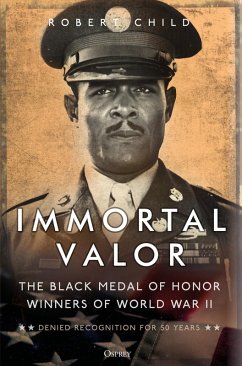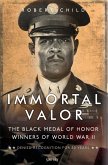The remarkable story of the seven African American soldiers ultimately awarded the World War II Medal of Honor, and the 50-year campaign to deny them their recognition.
In 1945, when Congress began reviewing the record of the most conspicuous acts of courage by American soldiers during World War II, they recommended awarding the Medal of Honor to 432 recipients. Despite the fact that more than one million African-Americans served, not a single black soldier received the Medal of Honor. The omission remained on the record for over four decades.
But recent historical investigations have brought to light some of the extraordinary acts of valor performed by black soldiers during the war. Men like Vernon Baker, who single-handedly eliminated three enemy machineguns, an observation post, and a German dugout. Or Sergeant Reuben Rivers, who spearhead his tank unit's advance against fierce German resistance for three days despite being grievously wounded. Meanwhile Lieutenant Charles Thomas led his platoon to capture a strategically vital village on the Siegfried Line in 1944 despite losing half his men and suffering a number of wounds himself.
Ultimately, in 1993 a US Army commission determined that seven men, including Baker, Rivers and Thomas, had been denied the Army's highest award simply due to racial discrimination. In 1997, more than 50 years after the war, President Clinton finally awarded the Medal of Honor to these seven heroes, sadly all but one of them posthumously.
These are their stories.
Hinweis: Dieser Artikel kann nur an eine deutsche Lieferadresse ausgeliefert werden.
In 1945, when Congress began reviewing the record of the most conspicuous acts of courage by American soldiers during World War II, they recommended awarding the Medal of Honor to 432 recipients. Despite the fact that more than one million African-Americans served, not a single black soldier received the Medal of Honor. The omission remained on the record for over four decades.
But recent historical investigations have brought to light some of the extraordinary acts of valor performed by black soldiers during the war. Men like Vernon Baker, who single-handedly eliminated three enemy machineguns, an observation post, and a German dugout. Or Sergeant Reuben Rivers, who spearhead his tank unit's advance against fierce German resistance for three days despite being grievously wounded. Meanwhile Lieutenant Charles Thomas led his platoon to capture a strategically vital village on the Siegfried Line in 1944 despite losing half his men and suffering a number of wounds himself.
Ultimately, in 1993 a US Army commission determined that seven men, including Baker, Rivers and Thomas, had been denied the Army's highest award simply due to racial discrimination. In 1997, more than 50 years after the war, President Clinton finally awarded the Medal of Honor to these seven heroes, sadly all but one of them posthumously.
These are their stories.
Hinweis: Dieser Artikel kann nur an eine deutsche Lieferadresse ausgeliefert werden.









